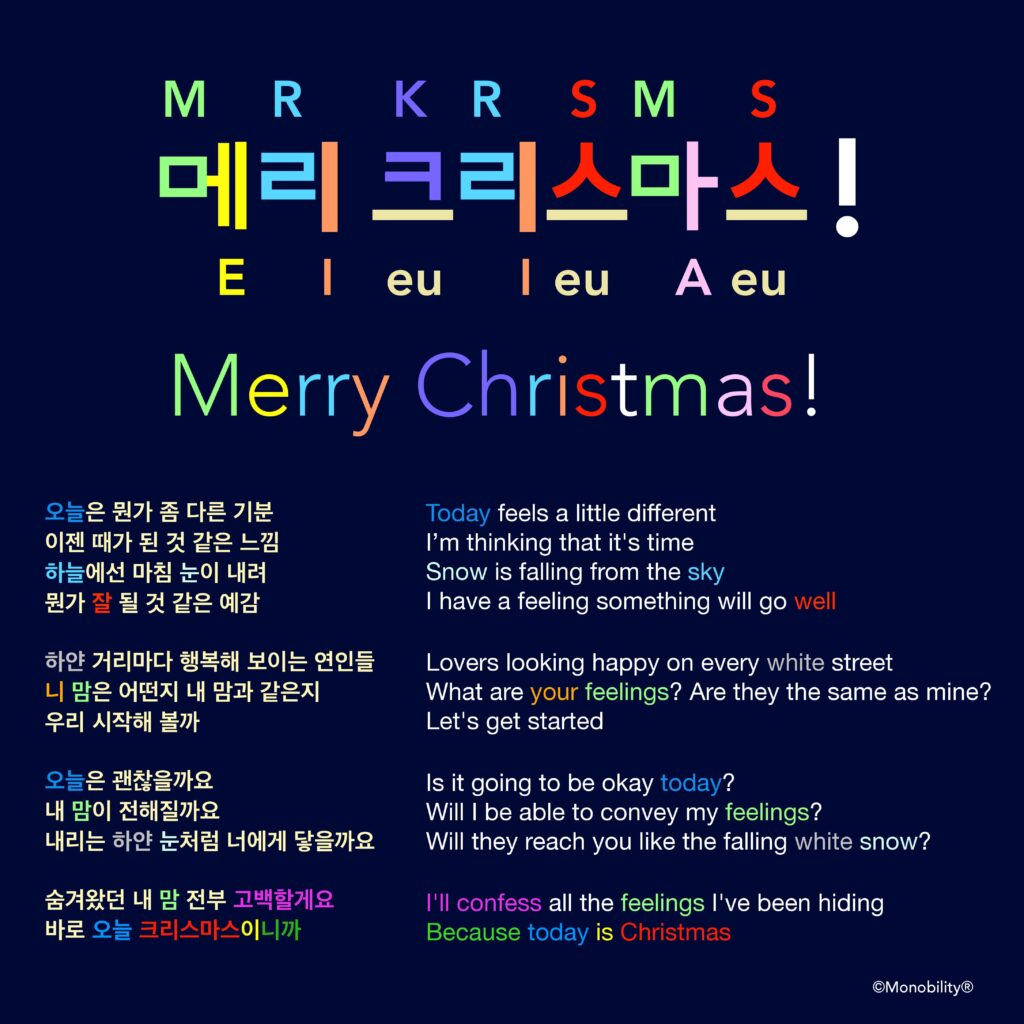메리 크리스마스, 여러분! 아기 예수님의 사랑이 모노빌리티® 그룹 멤버님들 모두의 마음에, 그리고 여러분의 가족과 나라에 가득하기를 기원합니다. 포근하고 행복한 성탄절 보내세요!
[formal register, professional situations]
Since It is Christmas, this quiz is like a funny party joke for you as our group member. It’s not easy to find something like this in your journey of Korean study. Your Korean grammar books or teachers probably tell you the following information on “your” and “my” in the informal register:
- 너의 your [ 너 you + 의 possessive particle ]
- 나의 my [ 나 I/me + 의 possessive particle ]
They are grammatically correct, but in spoken Korean, they are useless. Nobody speaks like that. In everyday Korean, people always use contracted forms:
- 너의 => 네 your [ 네 is the correct spelling in written Korean ]
- 나의 => 내 my
The issue is that 네 [ne] and 내 [nae] are pronounced nearly the same. Do you see how confusing it would be if people tried to say 네 and 내? “What? Are you talking about mine or yours?” 🙂
Most likely to avoid this confusion, Koreans say “니” instead of “네” in the standard Seoul speech (informal register):
- 니 your
- 내 my
- 임마, 이건 니 문제지 내 문제가 아냐 Dude, this is your problem, not mine.
Please note that “니가” with the subject particle 가 is also used as the subjective pronoun for “You” in the informal register:
- 니 문제니까 니가 해결해야지 Since it’s your problem, you should resolve it.
Then how do you say “yours” and “mine” in the informal register? Once again, forget what your books or teachers tell you: 너의 것, 나의 것 are never used. Instead, say:
- 니 꺼 yours [ 꺼 is the contraction of 것, which means “thing” = “your thing” = yours ]
- 내 꺼 mine [ same as above ]
What if you need to use a respectful register for a senior person? Say the person’s rank, position, or name + 님, then add 꺼:
- 이건 아버님 꺼, 저건 어머님 꺼예요. This is yours, Dad, and that is Mom’s.
- 이 서류는 교수님 껀데요. This document is yours, Professor.
In the video, you can hear how 니 맘 is spoken, meaning “your feeling/heart.” [ 맘 is a contraction of 마음 heart/feeling/mind ]
- 니 껀 니 꺼, 내 껀 내 꺼 Yours is yours, mine is mine. [ 개인주의자 Individualist ]
- 니 껀 내 꺼, 내 껀 니 꺼 Yours is mine, mine is yours. [ Shakespeare, Measure for Measure, Act. 5: “What’s mine is yours and what is yours is mine.” ]
- 니 꺼든 내 꺼든, 다 우리 꺼 Yours or mine, everything is ours. [ 공산주의자 Communist ]
- 니 껀 내 꺼, 내 껀 내 꺼 Yours is mine, mine is mine. [ 이기주의자 Egoist ]
Okay, then what would an altruist say in Korean?
Enjoy the puzzle! Merry Christmas, everyone!

Monobility® Group



